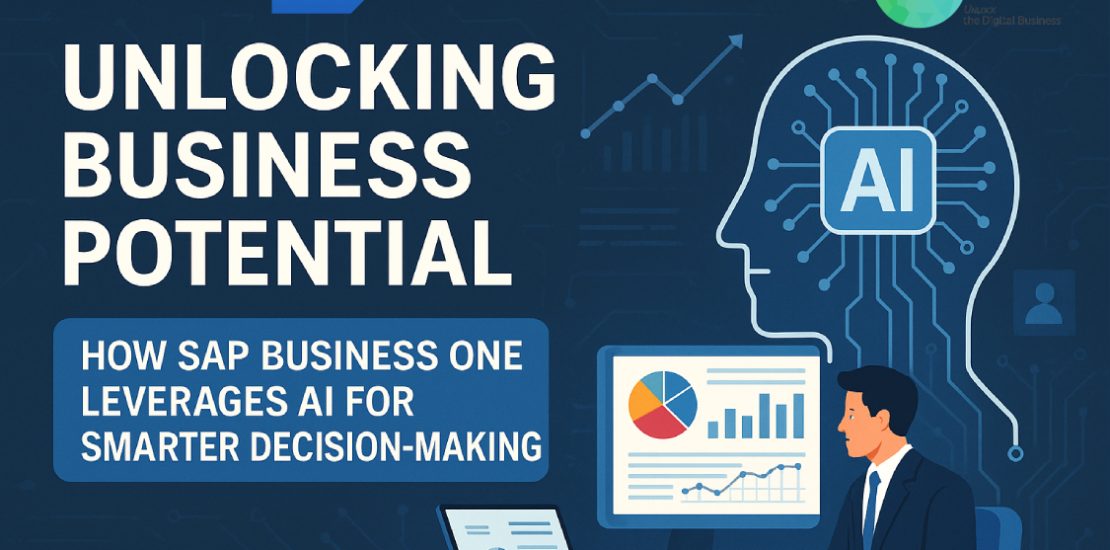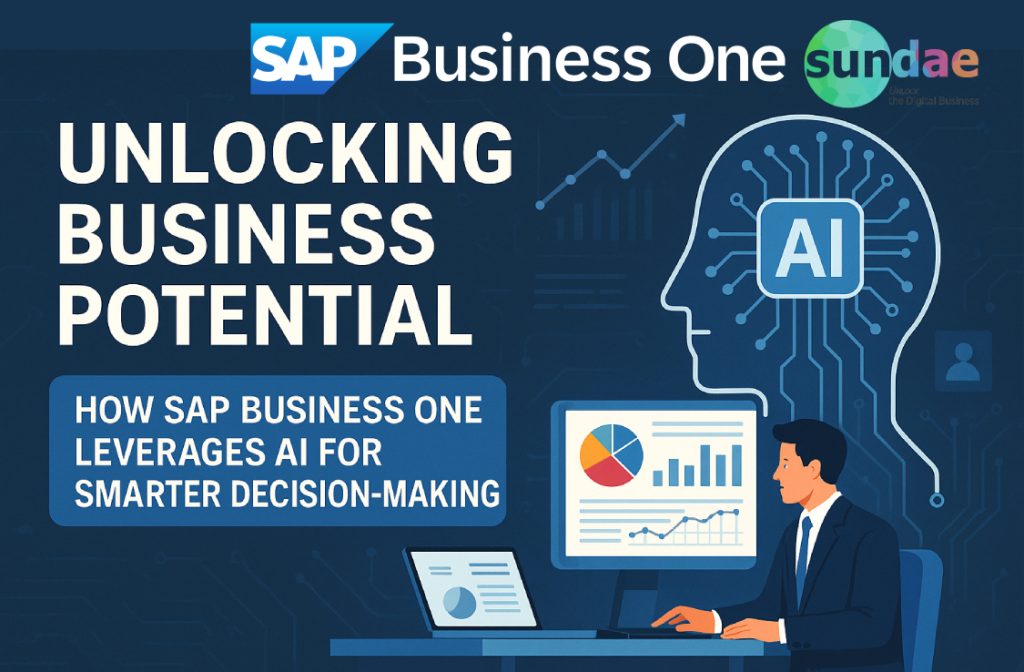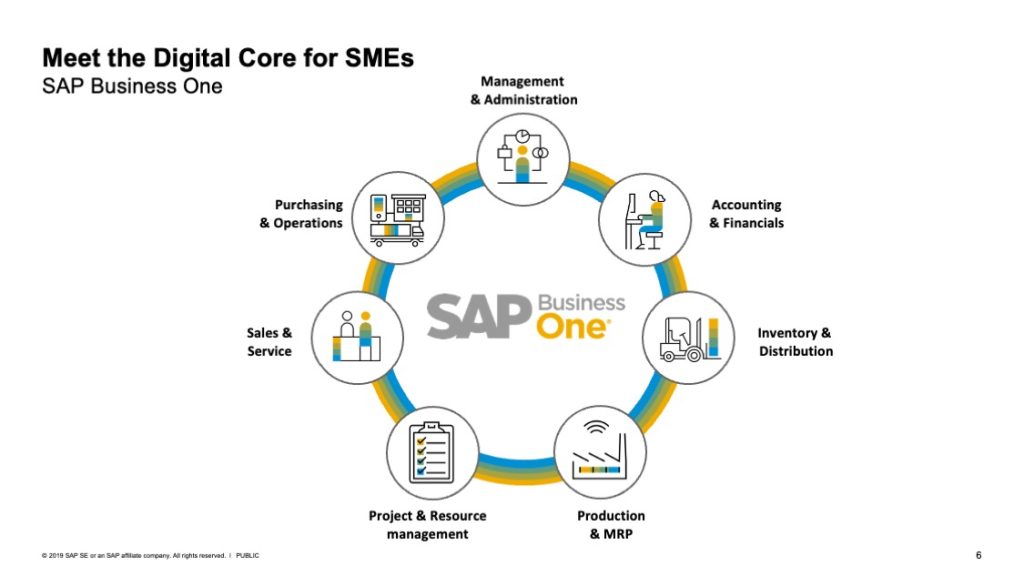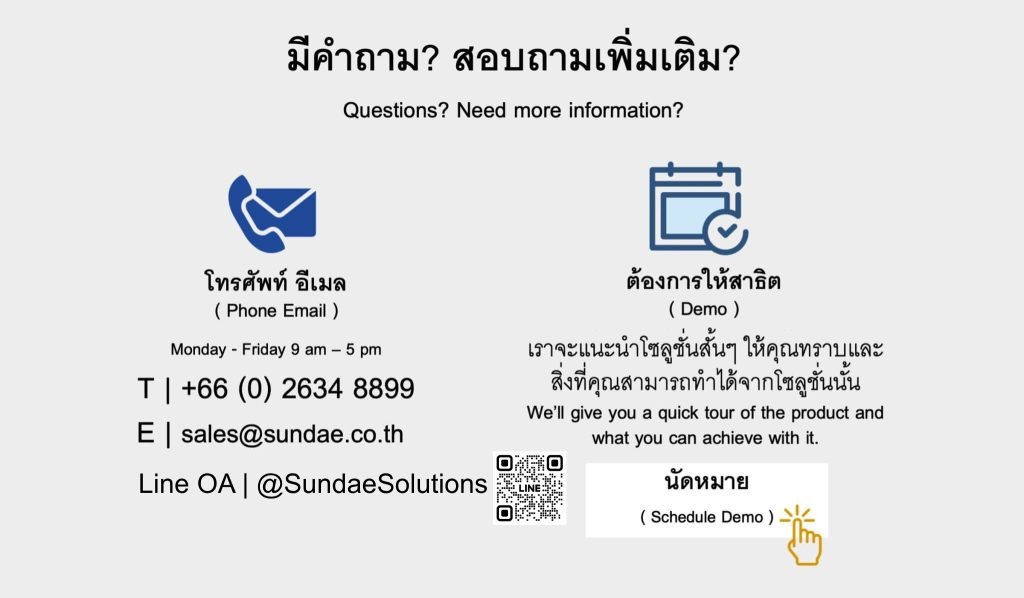Unlocking Business Potential:
How SAP Business One Leverages AI for Smarter Decision-Making
In today’s fast-paced business landscape, decision-making can make or break a company’s success. Enter SAP Business One, an innovative solution that is revolutionizing the way organizations harness data. By integrating advanced AI capabilities, SAP Business One empowers businesses to not only analyze their operations but also unlock insights that drive smarter decisions. Imagine having the ability to predict market trends, optimize resource allocation, and enhance customer engagement—all from a single platform. This article delves into how SAP Business One leverages AI to transform traditional business practices, enabling leaders to make informed, strategic choices that propel growth and efficiency. Join us on a journey to explore the untapped potential of AI in business management, and discover how you can start making decisions that lead to extraordinary outcomes.
Understanding Artificial Intelligence in Business
Artificial Intelligence (AI) has become a cornerstone of modern business strategy. At its core, AI refers to the simulation of human intelligence in machines that are programmed to think and learn like humans. These systems are designed to perform tasks that typically require human intelligence, such as visual perception, speech recognition, decision-making, and language translation. The adoption of AI technologies allows businesses to process vast amounts of data at unparalleled speeds, providing insights that would be impossible to obtain through manual analysis.
In the realm of business, AI is used to enhance and automate processes, drive efficiencies, and deliver better customer experiences. For instance, AI-powered chatbots can handle customer inquiries 24/7, providing instant responses and freeing up human agents to tackle more complex issues. AI algorithms can also analyze consumer behavior and preferences to create personalized marketing campaigns that resonate with individual customers. By leveraging AI, businesses can gain a competitive edge, making more informed decisions and responding swiftly to market changes.
Moreover, the integration of AI in business applications goes beyond automation and efficiency. It enables predictive analytics, which can forecast future trends based on historical data. This foresight allows businesses to anticipate market shifts, adjust their strategies accordingly, and stay ahead of the competition. AI also plays a crucial role in risk management by identifying potential threats and suggesting preventive measures. In essence, AI transforms data into actionable insights, empowering businesses to navigate the complexities of the modern market with confidence.
The Role of AI in SAP Business One
SAP Business One is a comprehensive enterprise resource planning (ERP) solution designed specifically for small and medium-sized enterprises (SMEs). It provides a unified platform that integrates various business functions, including finance, sales, inventory management, and customer relationship management. The integration of AI into SAP Business One enhances its capabilities, making it a powerful tool for data-driven decision-making.
One of the primary roles of AI in SAP Business One is to streamline and automate business processes. AI algorithms can analyze large datasets to identify patterns and anomalies, allowing businesses to optimize their operations. For example, AI can predict inventory needs based on historical sales data, ensuring that stock levels are maintained without overstocking or understocking. This predictive capability helps businesses reduce costs, improve efficiency, and enhance customer satisfaction.
Another significant role of AI in SAP Business One is to provide real-time insights and analytics. Traditional business intelligence tools often rely on static reports that are outdated by the time they are analyzed. In contrast, AI-powered analytics provide real-time data that reflects the current state of the business. This real-time insight enables decision-makers to respond quickly to emerging trends and make informed decisions on the fly. Additionally, AI can identify correlations and causations that may not be apparent to human analysts, uncovering hidden opportunities and risks.
Furthermore, AI in SAP Business One enhances customer relationship management by providing personalized experiences. AI algorithms can analyze customer data to identify preferences, behaviors, and purchase patterns. This information can be used to tailor marketing campaigns, recommend products, and provide personalized customer service. By understanding and anticipating customer needs, businesses can build stronger relationships and drive customer loyalty. Overall, the integration of AI into SAP Business One transforms it into a smart, responsive, and proactive business management solution.
Key Features of AI Integration in SAP Business One
The integration of AI into SAP Business One introduces a suite of advanced features that enhance its functionality and usability. One such feature is predictive analytics, which leverages machine learning algorithms to forecast future trends and outcomes. By analyzing historical data, predictive analytics can identify patterns and predict future events, such as sales trends, customer behavior, and inventory needs. This foresight enables businesses to make proactive decisions, optimize resources, and stay ahead of the competition.
Another key feature is automated anomaly detection. AI algorithms can continuously monitor business processes and data to identify deviations from the norm. These anomalies could indicate potential issues, such as fraud, operational inefficiencies, or emerging market trends. Automated anomaly detection allows businesses to address problems promptly, minimizing risks and ensuring smooth operations. Moreover, AI can provide actionable recommendations on how to resolve these anomalies, further enhancing decision-making.
AI-powered natural language processing (NLP) is another transformative feature integrated into SAP Business One. NLP enables the system to understand and interpret human language, making it easier for users to interact with the software. For example, users can input queries in natural language to retrieve information, generate reports, and perform analyses. This user-friendly interface reduces the learning curve and makes the system more accessible to non-technical users. Additionally, NLP can be used to analyze unstructured data, such as customer feedback and social media posts, providing valuable insights into customer sentiment and market trends.
Furthermore, AI in SAP Business One facilitates intelligent automation. Routine tasks, such as data entry, invoice processing, and report generation, can be automated using AI algorithms. This automation not only saves time and reduces human error but also frees up employees to focus on more strategic activities. Intelligent automation improves overall efficiency and productivity, allowing businesses to achieve more with less effort. In summary, the key features of AI integration in SAP Business One enhance its capabilities, making it a powerful tool for data-driven decision-making and operational efficiency.
Benefits of Leveraging AI for Decision-Making
The benefits of leveraging AI for decision-making in business are manifold. One of the most significant advantages is the ability to make data-driven decisions. AI algorithms can analyze vast amounts of data quickly and accurately, providing insights that inform decision-making. This data-driven approach reduces reliance on intuition and guesswork, leading to more accurate and effective decisions. By basing decisions on data, businesses can improve their strategies, optimize operations, and achieve better outcomes.
Another benefit is enhanced efficiency and productivity. AI can automate routine tasks, such as data entry, report generation, and customer service inquiries. This automation not only saves time but also reduces the risk of human error. Employees can focus on more strategic activities, such as innovation, problem-solving, and customer engagement. As a result, businesses can operate more efficiently, achieve higher productivity, and deliver better value to their customers.
AI also enables businesses to gain a deeper understanding of their customers. By analyzing customer data, AI can identify preferences, behaviors, and trends, allowing businesses to tailor their offerings and marketing campaigns. This personalized approach enhances customer satisfaction and loyalty, driving long-term business success. Moreover, AI can provide real-time insights into customer sentiment, enabling businesses to respond quickly to feedback and address issues promptly.
Additionally, AI enhances risk management by identifying potential threats and suggesting preventive measures. For example, AI can detect fraudulent transactions, predict equipment failures, and identify operational inefficiencies. By addressing these risks proactively, businesses can avoid costly disruptions and maintain smooth operations. Furthermore, AI can provide recommendations on how to mitigate risks, further enhancing decision-making.
In conclusion, leveraging AI for decision-making offers numerous benefits, including data-driven insights, enhanced efficiency, deeper customer understanding, and improved risk management. By integrating AI into their business processes, organizations can make smarter decisions, optimize their operations, and achieve better outcomes. AI transforms data into actionable insights, empowering businesses to navigate the complexities of the modern market with confidence.
Real-World Applications of AI in SAP Business One
The real-world applications of AI in SAP Business One are diverse and impactful, transforming various aspects of business operations. One notable application is in inventory management. AI algorithms can analyze historical sales data, seasonal trends, and market conditions to predict future inventory needs. This predictive capability ensures that businesses maintain optimal stock levels, reducing the risk of overstocking or stockouts. By optimizing inventory management, businesses can reduce costs, improve cash flow, and enhance customer satisfaction.
Another significant application is in customer relationship management (CRM). AI can analyze customer data to identify preferences, behaviors, and purchase patterns. This information can be used to segment customers, tailor marketing campaigns, and provide personalized recommendations. For example, AI can suggest products or services that are likely to interest a particular customer, enhancing the shopping experience and driving sales. Additionally, AI-powered chatbots can handle customer inquiries 24/7, providing instant responses and improving customer service.
AI also plays a crucial role in financial management. AI algorithms can analyze financial data to identify patterns, anomalies, and trends. This analysis can help businesses detect fraudulent transactions, manage cash flow, and optimize budgeting and forecasting. For example, AI can predict future revenue based on historical data, allowing businesses to plan their finances more effectively. Moreover, AI can automate routine financial tasks, such as invoice processing and expense tracking, improving efficiency and reducing the risk of errors.
In the field of human resources (HR), AI can streamline recruitment and talent management processes. AI algorithms can analyze resumes, job applications, and social media profiles to identify the best candidates for a job. This automation saves time and ensures that businesses hire the most qualified candidates. Additionally, AI can analyze employee performance data to identify strengths, weaknesses, and development needs. This information can be used to create personalized training programs, improving employee performance and satisfaction.
Overall, the real-world applications of AI in SAP Business One are vast and varied, transforming inventory management, CRM, financial management, and HR processes. By leveraging AI, businesses can optimize their operations, enhance customer experiences, and achieve better outcomes. AI empowers businesses to make smarter decisions, operate more efficiently, and stay ahead in the competitive market.
Comparing Traditional Decision-Making vs. AI-Driven Approaches
Traditional decision-making in business often relies on intuition, experience, and manual analysis of data. While these methods have been effective in the past, they come with limitations. Human decision-makers can only process a limited amount of information, and their judgments are subject to biases and errors. Moreover, traditional decision-making can be time-consuming, as it involves gathering, analyzing, and interpreting data manually. This approach may not be sufficient in today’s fast-paced business environment, where timely and accurate decisions are critical.
In contrast, AI-driven decision-making leverages advanced algorithms to analyze vast amounts of data quickly and accurately. AI can process complex datasets, identify patterns, and generate insights that inform decision-making. This data-driven approach reduces reliance on intuition and guesswork, leading to more accurate and effective decisions. AI can also provide real-time insights, enabling businesses to respond quickly to emerging trends and changes in the market. Additionally, AI can identify correlations and causations that may not be apparent to human analysts, uncovering hidden opportunities and risks.
One of the key advantages of AI-driven decision-making is its ability to eliminate biases. Human decision-makers are prone to cognitive biases, such as confirmation bias, overconfidence, and anchoring. These biases can lead to suboptimal decisions and missed opportunities. AI algorithms, on the other hand, are designed to be objective and impartial, analyzing data based on predefined criteria. This objectivity ensures that decisions are based on facts and evidence rather than personal biases.
Moreover, AI-driven decision-making is significantly faster than traditional methods. AI can analyze large datasets in a fraction of the time it would take a human analyst, providing insights almost instantaneously. This speed is crucial in today’s dynamic business environment, where timely decisions can make the difference between success and failure. By leveraging AI, businesses can stay agile and responsive, adapting quickly to changes and seizing opportunities as they arise.
In summary, while traditional decision-making relies on intuition, experience, and manual analysis, AI-driven approaches leverage advanced algorithms to analyze data quickly and accurately. AI eliminates biases, provides real-time insights, and enables faster decision-making. By adopting AI-driven decision-making, businesses can make more informed, accurate, and timely decisions, leading to better outcomes and a competitive advantage in the market.
Challenges and Considerations in Implementing AI
While the benefits of AI in business are undeniable, implementing AI comes with its own set of challenges and considerations. One of the primary challenges is data quality and availability. AI algorithms rely on large volumes of high-quality data to generate accurate insights. However, many businesses struggle with data silos, incomplete datasets, and inconsistent data formats. Ensuring that data is clean, complete, and accessible is crucial for the success of AI initiatives.
Another challenge is the complexity of AI technologies. Implementing AI requires specialized knowledge and skills, which may not be readily available within the organization. Businesses may need to invest in training and upskilling their employees or hire external experts to manage AI projects. Additionally, integrating AI with existing systems and processes can be complex and time-consuming, requiring careful planning and execution.
Ethical considerations also play a significant role in AI implementation. AI algorithms are only as good as the data they are trained on, and biased data can lead to biased outcomes. Ensuring that AI systems are fair, transparent, and accountable is crucial to avoid unintended consequences. Businesses must take steps to mitigate bias, ensure data privacy, and maintain ethical standards in their AI initiatives. This may involve conducting regular audits, establishing ethical guidelines, and involving diverse stakeholders in the development and deployment of AI systems.
Moreover, the cost of implementing AI can be a significant barrier for many businesses, particularly SMEs. Developing and deploying AI systems can be expensive, requiring investments in hardware, software, and talent. Businesses must carefully assess the return on investment (ROI) and ensure that the benefits of AI outweigh the costs. Additionally, businesses must consider the ongoing maintenance and support costs associated with AI systems.
Finally, there is the challenge of change management. Implementing AI often involves significant changes to existing processes, workflows, and job roles. Employees may be resistant to these changes, fearing job displacement or increased workloads. Effective change management strategies are essential to address these concerns, ensure employee buy-in, and facilitate a smooth transition. This may involve clear communication, training, and involvement of employees in the AI implementation process.
In conclusion, while implementing AI in business offers numerous benefits, it also comes with challenges related to data quality, complexity, ethics, cost, and change management. Businesses must address these challenges proactively to ensure the successful implementation of AI and maximize its potential. By taking a thoughtful and strategic approach, businesses can overcome these hurdles and leverage AI to drive smarter decision-making, optimize operations, and achieve better outcomes.
Future Trends: The Evolution of AI in Business Management
The evolution of AI in business management is set to bring about transformative changes in the way organizations operate and make decisions. One of the emerging trends is the increasing use of AI-powered predictive analytics. As AI algorithms become more sophisticated, they will be able to analyze even larger and more complex datasets, providing more accurate and granular predictions. This capability will enable businesses to anticipate market trends, customer needs, and operational challenges with greater precision, allowing for more proactive and strategic decision-making.
Another significant trend is the rise of AI-driven automation. While AI has already made significant inroads in automating routine tasks, the future will see even more advanced automation capabilities. AI will be able to handle more complex and dynamic processes, such as supply chain management, financial planning, and customer service. This level of automation will not only improve efficiency and productivity but also free up employees to focus on higher-value activities, such as innovation and strategic planning.
The integration of AI with other emerging technologies, such as the Internet of Things (IoT) and blockchain, is another trend to watch. IoT devices generate vast amounts of data that can be harnessed by AI to provide real-time insights and optimize operations. For example, AI can analyze data from IoT sensors to predict equipment failures, optimize energy usage, and improve supply chain efficiency. Similarly, blockchain technology can enhance the security and transparency of AI systems, ensuring that data is trustworthy and tamper-proof.
Moreover, the future of AI in business management will see a greater emphasis on ethical AI. As AI becomes more pervasive, there will be increased scrutiny on its ethical implications, such as bias, transparency, and accountability. Businesses will need to adopt ethical guidelines and practices to ensure that their AI systems are fair, transparent, and aligned with societal values. This may involve conducting regular audits, involving diverse stakeholders, and implementing mechanisms for accountability and redress.
Additionally, the democratization of AI is set to be a major trend. Advances in AI technology are making it more accessible and affordable for businesses of all sizes. AI-as-a-Service (AIaaS) platforms are emerging, allowing businesses to leverage AI capabilities without the need for significant upfront investments. These platforms provide pre-built AI models and tools that can be easily integrated into existing systems, democratizing access to AI and leveling the playing field for SMEs.
In summary, the future of AI in business management will be characterized by advancements in predictive analytics, AI-driven automation, integration with IoT and blockchain, a focus on ethical AI, and the democratization of AI. These trends will bring about transformative changes, enabling businesses to operate more efficiently, make smarter decisions, and achieve better outcomes. By staying ahead of these trends and embracing AI, businesses can unlock new opportunities and drive sustained growth and success.
Conclusion: Maximizing Business Potential with SAP Business One and AI
In today’s dynamic business environment, the ability to make informed, data-driven decisions is crucial for success. SAP Business One, with its advanced AI capabilities, provides businesses with a powerful tool to unlock insights, optimize operations, and drive smarter decision-making. By leveraging AI, businesses can predict market trends, personalize customer experiences, and enhance efficiency, leading to better outcomes and a competitive edge.
The integration of AI into SAP Business One introduces a range of transformative features, including predictive analytics, automated anomaly detection, natural language processing, and intelligent automation. These features enhance the functionality and usability of the platform, making it a comprehensive solution for business management. The benefits of AI-driven decision-making are manifold, including data-driven insights, enhanced efficiency, deeper customer understanding, and improved risk management.
Real-world applications of AI in SAP Business One span various business functions, from inventory management and customer relationship management to financial management and human resources. By adopting AI, businesses can optimize their operations, enhance customer experiences, and achieve better outcomes. However, implementing AI comes with its own set of challenges, including data quality, complexity, ethics, cost, and change management. Businesses must address these challenges proactively to ensure successful implementation and maximize the potential of AI.
Looking ahead, the future of AI in business management holds exciting possibilities, with advancements in predictive analytics, AI-driven automation, integration with IoT and blockchain, a focus on ethical AI, and the democratization of AI. These trends will bring about transformative changes, enabling businesses to operate more efficiently, make smarter decisions, and achieve sustained growth and success.
In conclusion, SAP Business One and AI together offer a powerful solution for maximizing business potential. By embracing AI and leveraging its capabilities, businesses can navigate the complexities of the modern market with confidence, make informed strategic choices, and drive extraordinary outcomes. The journey to unlocking business potential with SAP Business
More information about SAP Business One, please contact:
Sundae Solutions Co., Ltd.
T| 026348899 E| sales@sundae.co.th
W| https://www.sundae.co.th/en/solutions/erp/sap-business-one/
Follow us:
Line OA: @SundaeSolutions
Facebook: https://www.facebook.com/sundaesolutions
LinkedIn: https://www.linkedin.com/company/sundaeth
IG https://www.instagram.com/sundaesolutions/
X https://www.x.com/@SundaeSolutions
#ERP #Software #SundaeSolutions
- June 21, 2025
- Posted by: sundaeadmin
- Category: Articles-EN





